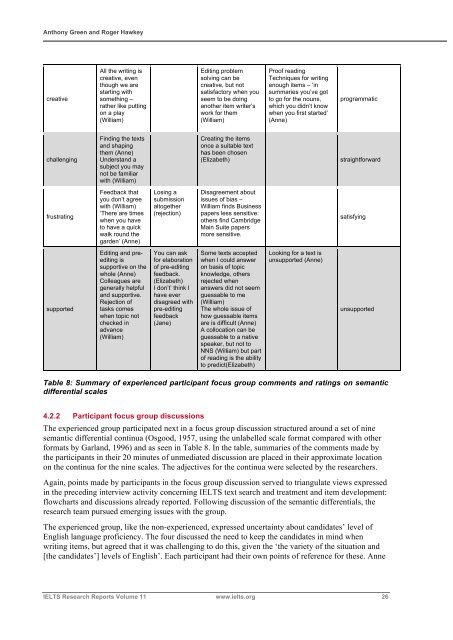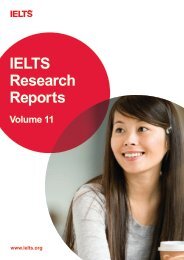An investigation of the process of writing IELTS Academic Reading ...
An investigation of the process of writing IELTS Academic Reading ...
An investigation of the process of writing IELTS Academic Reading ...
You also want an ePaper? Increase the reach of your titles
YUMPU automatically turns print PDFs into web optimized ePapers that Google loves.
<strong>An</strong>thony Green and Roger Hawkey<br />
creative<br />
All <strong>the</strong> <strong>writing</strong> is<br />
creative, even<br />
though we are<br />
starting with<br />
something –<br />
ra<strong>the</strong>r like putting<br />
on a play<br />
(William)<br />
Editing problem<br />
solving can be<br />
creative, but not<br />
satisfactory when you<br />
seem to be doing<br />
ano<strong>the</strong>r item writer’s<br />
work for <strong>the</strong>m<br />
(William)<br />
Pro<strong>of</strong> reading<br />
Techniques for <strong>writing</strong><br />
enough items – ‘in<br />
summaries you’ve got<br />
to go for <strong>the</strong> nouns,<br />
which you didn’t know<br />
when you first started’<br />
(<strong>An</strong>ne)<br />
programmatic<br />
challenging<br />
Finding <strong>the</strong> texts<br />
and shaping<br />
<strong>the</strong>m (<strong>An</strong>ne)<br />
Understand a<br />
subject you may<br />
not be familiar<br />
with (William)<br />
Creating <strong>the</strong> items<br />
once a suitable text<br />
has been chosen<br />
(Elizabeth)<br />
straightforward<br />
frustrating<br />
Feedback that<br />
you don’t agree<br />
with (William)<br />
‘There are times<br />
when you have<br />
to have a quick<br />
walk round <strong>the</strong><br />
garden’ (<strong>An</strong>ne)<br />
Losing a<br />
submission<br />
altoge<strong>the</strong>r<br />
(rejection)<br />
Disagreement about<br />
issues <strong>of</strong> bias –<br />
William finds Business<br />
papers less sensitive:<br />
o<strong>the</strong>rs find Cambridge<br />
Main Suite papers<br />
more sensitive.<br />
satisfying<br />
supported<br />
Editing and preediting<br />
is<br />
supportive on <strong>the</strong><br />
whole (<strong>An</strong>ne)<br />
Colleagues are<br />
generally helpful<br />
and supportive.<br />
Rejection <strong>of</strong><br />
tasks comes<br />
when topic not<br />
checked in<br />
advance<br />
(William)<br />
You can ask<br />
for elaboration<br />
<strong>of</strong> pre-editing<br />
feedback.<br />
(Elizabeth)<br />
I don’t’ think I<br />
have ever<br />
disagreed with<br />
pre-editing<br />
feedback<br />
(Jane)<br />
Some texts accepted<br />
when I could answer<br />
on basis <strong>of</strong> topic<br />
knowledge, o<strong>the</strong>rs<br />
rejected when<br />
answers did not seem<br />
guessable to me<br />
(William)<br />
The whole issue <strong>of</strong><br />
how guessable items<br />
are is difficult (<strong>An</strong>ne)<br />
A collocation can be<br />
guessable to a native<br />
speaker, but not to<br />
NNS (William) but part<br />
<strong>of</strong> reading is <strong>the</strong> ability<br />
to predict(Elizabeth)<br />
Looking for a text is<br />
unsupported (<strong>An</strong>ne)<br />
unsupported<br />
Table 8: Summary <strong>of</strong> experienced participant focus group comments and ratings on semantic<br />
differential scales<br />
4.2.2 Participant focus group discussions<br />
The experienced group participated next in a focus group discussion structured around a set <strong>of</strong> nine<br />
semantic differential continua (Osgood, 1957, using <strong>the</strong> unlabelled scale format compared with o<strong>the</strong>r<br />
formats by Garland, 1996) and as seen in Table 8. In <strong>the</strong> table, summaries <strong>of</strong> <strong>the</strong> comments made by<br />
<strong>the</strong> participants in <strong>the</strong>ir 20 minutes <strong>of</strong> unmediated discussion are placed in <strong>the</strong>ir approximate location<br />
on <strong>the</strong> continua for <strong>the</strong> nine scales. The adjectives for <strong>the</strong> continua were selected by <strong>the</strong> researchers.<br />
Again, points made by participants in <strong>the</strong> focus group discussion served to triangulate views expressed<br />
in <strong>the</strong> preceding interview activity concerning <strong>IELTS</strong> text search and treatment and item development:<br />
flowcharts and discussions already reported. Following discussion <strong>of</strong> <strong>the</strong> semantic differentials, <strong>the</strong><br />
research team pursued emerging issues with <strong>the</strong> group.<br />
The experienced group, like <strong>the</strong> non-experienced, expressed uncertainty about candidates’ level <strong>of</strong><br />
English language pr<strong>of</strong>iciency. The four discussed <strong>the</strong> need to keep <strong>the</strong> candidates in mind when<br />
<strong>writing</strong> items, but agreed that it was challenging to do this, given <strong>the</strong> ‘<strong>the</strong> variety <strong>of</strong> <strong>the</strong> situation and<br />
[<strong>the</strong> candidates’] levels <strong>of</strong> English’. Each participant had <strong>the</strong>ir own points <strong>of</strong> reference for <strong>the</strong>se. <strong>An</strong>ne<br />
<strong>IELTS</strong> Research Reports Volume 11 www.ielts.org 26

















